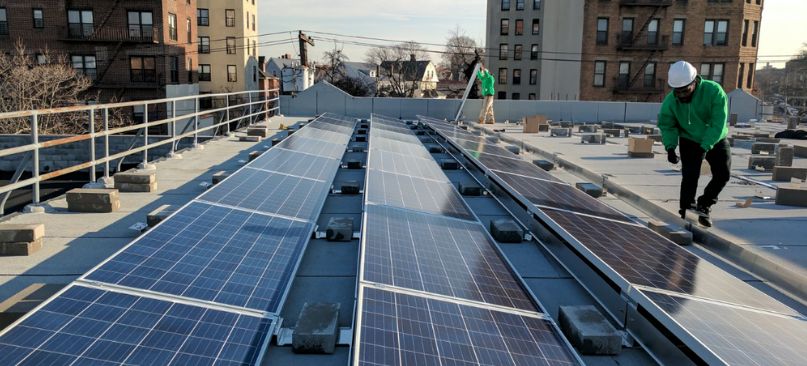
BENJAMIN STEMER AUGUST 20, 2019
Over the past few decades, global concern surrounding the rapid change in our Earth’s climate has consistently risen, to the point that many U.S. states are taking independent and decisive action for the welfare of the environment, their citizens, and the global population as a whole. Colorado is just one example of this trend which favors a reduction on energy produced from coal, and an increased emphasis on renewable alternatives. On May 28th 2019, Colorado signed into law the “Just Transition from Coal-based Energy” which incentivizes the early termination of coal plants, while simultaneously providing financial support for any citizens who may be negatively impacted by the early closing of these coal plants.
With an issue as complicated and misunderstood as climate change, finding and implementing realistic and timely solutions for our climate crisis has proven to be extremely difficult. However, Colorado is not intimidated by the scope and seriousness of this subject and, as a result, they have moved beyond simply discussing this issue through the passing of their decisive policy titled the “Just Transition from Coal-based Energy”. According to the Institute of Energy Economics and Financial Analysis, with the introduction of this bill, Colorado is setting a strong example for other states to follow (1). This new law creates a Just Transition Advisory Committee, which consists of directors from the Department of Labor and Employment, the Colorado Energy Office, The Department of Local Affairs, representatives from the Governor’s office and the State Senate, as well as 12 local representatives, including three coal workers, three coal community representatives, two members from disproportionately impacted communities, and two experts on economic development and/or workforce retraining. The purpose of the Just Transition Advisory Committee is to create a plan that will provide benefits for impacted workers, make grants available for communities heavily reliant on the coal industry, and offer additional support for anyone impacted by the early closing of coal plants all across Colorado. One highlight of this bill is that any costs associated with supporting impacted workers and communities will be paid for through a process of voluntary securitization of investor-owned coal plants (2). If you’re like most people, you might not have any idea what the process of securitization entails, so let me explain.
Voluntary securitization provides coal plant owners the option to refinance their high levels of debt at a much lower interest rate than conventional coal plants typically receive. The process of building and operating coal plants is an extremely expensive practice and, as a result, coal plants tend to rack up huge sums of debt. Industry standards for the financing of coal plants generally charges an interest rate at around 7%, Colorado’s new legislation would allow coal plants to voluntarily refinance their debt and accept something called a Ratepayer-backed bond, which would accrue interest at only 3%. The only requirement to refinance with Ratepayer-backed bonds is that the utility owners must accelerate plans for shutting down and dismantling their coal plants.
So, will coal plant owners actually participate in this program if they only save 4% interest? Colorado believes they will. While 4% difference in interest might seem like a small incentive, when you’re borrowing millions or even billions of dollars, that 4% adds up very quickly. The key to funding the Just Transition Advisory Committee’s financial support plan for impacted workers comes directly from this interest earned on the Ratepayer-backed bonds. Anywhere from 15% to 25% of the interest earned on these Ratepayer-backed bonds will go straight to assisting those impacted by the early plant closures and helping to transition workers into new careers in different industries (2).
In addition to investor-owned coal plants costing billions to build and operate, they also produce energy at nearly twice the cost of their renewable counterparts. Utility owners are being provided an option to produce energy at a much cheaper rate by utilizing renewable alternatives. By moving away from the practice of buying, transporting, and burning coal, utility owners can invest in cheaper alternatives such as solar plants which operate with minimal fees. It is not only in the best interest of the environment to transition towards a more renewable energy grid, it is also in the best interest of everyday citizens who want to see less money going towards their electrical bills and more money in their bank accounts. The reason Colorado is confident that many coal plants will utilize this securitization policy is because it makes simple economic sense. Instead of paying 7% interest on billion dollar loans, they can pay 3% on secured bonds; instead of having to buy coal at fluctuating prices from neighboring states or countries, they can rely entirely on free stores of energy such as the sun and wind; instead of passing on large costs to their consumers, they can cut electric bills in half, all while increasing their profits and protecting the environment (3). This is truly a win-win-win situation.
The only group hurting from the early termination of coal plants are those who rely on the coal industry as a primary source of income, but Colorado has a plan to support and justly transition these people towards a brighter future. Colorado expects to bring in millions of dollars from the interest earned on the Ratepayer-backed bonds and will utilize a substantial portion of those earnings to support impacted workers and communities (4). Of the millions of dollars earned from this plan, the Just Transition Advisory Committee will put aside up to 25% of all interest earned in order to provide wage differential benefits for affected workers, educational opportunities for dislocated workers, and create a grant program for any other individuals or groups impacted by this policy.
As the name of this legislation indicates, this is simply a transitionary program, funding for those impacted is not meant to last forever, a major goal of this legislation is to provide short term assistance to those that need financial support while being educated or searching for new work opportunities. Colorado has no intention to forget about their coal miners and coal plant operators, however, it is in the best interest of the state, and the world as a whole, to transition off of coal and towards other, more sustainable alternatives. As such, Colorado hopes that its coal workers will quickly and effectively find work outside the coal industry, but has created a strong financial support network to assist coal workers all across the state.
This program mirrors similar legislation passed in Germany earlier this year, which plans to close all of its coal plants in the next two decades (5). Within the US, many other states are noticing the excessive costs and environmental impact of coal and are taking similar action to retire coal plants and emphasize a focus on renewable alternatives (6).
Bibliography:
Cited Sources:
- “IEEFA U.S.: Seeds of a Just Coal Transition Policy in Colorado.” Institute for Energy Economics & Financial Analysis, 9 May 2019, http://ieefa.org/ieefa-u-s-seeds-of-a-just-coal-transition-policy-in-colorado/.
- Best, Allen. “How Refinancing Could Help Retire Colorado Coal Plants Sooner.” Energy News Network, 2 Oct. 2018, https://energynews.us/2018/10/02/west/how-refinancing-could-help-retire-colorado-coal-plants-sooner/.
- Berke, Jeremy. “One Simple Chart Shows Why an Energy Revolution Is Coming – and Who Is Likely to Come out on Top.” Business Insider, Business Insider, 8 May 2018, https://www.businessinsider.com/solar-power-cost-decrease-2018-5/.
- “Cost of Solar Power vs Cost of Wind Power, Coal, Nuclear, & Natural Gas.” CleanTechnica, 13 Aug. 2017, https://cleantechnica.com/2016/12/25/cost-of-solar-power-vs-cost-of-wind-power-coal-nuclear-natural-gas/.
- Kirschbaum, Erik. “Germany to Close All 84 of Its Coal-Fired Power Plants, Will Rely Primarily on Renewable Energy.” Los Angeles Times, Los Angeles Times, 26 Jan. 2019, https://www-latimes-com.cdn.ampproject.org/c/s/www.latimes.com/world/europe/la-fg-germany-coal-power-20190126-story.html?_amp=true.
- “What’s Driving the Decline of Coal in the United States.” Climate Nexus, 21 Mar. 2019, https://climatenexus.org/climate-issues/energy/whats-driving-the-decline-of-coal-in-the-united-states/.
Other Sources:
- Cross, Andy, et al. “The Just Transition for Coal Workers Can Start Now. Colorado Is Showing How.” Truthout, Truthout, 29 July 2019, https://truthout.org/articles/the-just-transition-for-coal-workers-can-start-now-colorado-is-showing-how/.
- Nelder, Chris, and Chris Hansen. “[Episode #92] – Financing Coal Plant Retirements.” XE Network, The Energy Transition Show, https://xenetwork.org/ets/episodes/episode-92-financing-coal-plant-retirements/.




